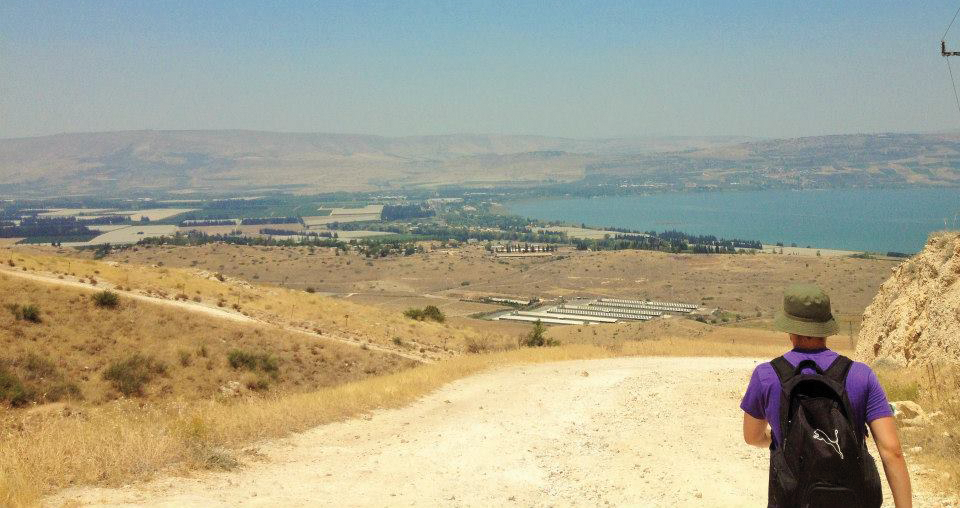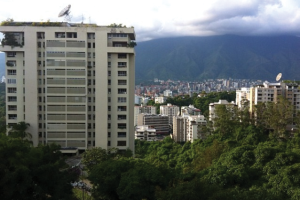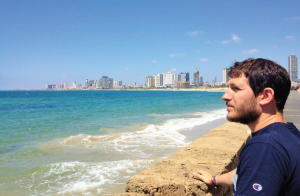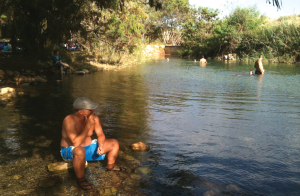
A view of Israel
For all international students, adjusting to life at Georgetown can pose a significant challenge. But for those who come from countries sprawled across the front pages of American newspapers due to violent protests, devastating typhoons and even a renewed military regional conflict, the shift in lifestyle and experience is even more drastic.
From difficulty with communication to dealing with peers’ perspectives on their country’s issues, students from nations perceived by American media to be in crisis face numerous challenges in dealing with the tensions between their two homes. For some, studying in the United States has opened up their outlook on the events taking place in their country, and for some it has led to a re-evaluation of their culture.
Ultimately, international students try to show that their home countries are much more than what fellow students see in a breaking news clip or a hotly debated Facebook post.
The Philippines
Natalia Peña (COL ’17)
For Natalia Peña, moving away from Manila echoed on a magnified scale the tradition of students looking to establish their individuality and grow as a person in college.
“Our culture back home is that you live with your parents even as you attend college, even as you work, until you get married. It’s a very traditional, Catholic country. So I really wanted to be on my own,” she said.
Peña also sought a new perspective on the Catholic traditions that had defined her childhood at a Jesuit institution.
“In the Philippines, abortion is illegal and contraceptives are illegal,” Peña said. “It’s good to break out of that mindset and live the world. Coming from a country where divorce isn’t even legal, I think Americans really do have the freedom to do and pursue what they want.”
But while moving to the United States has given Peña the opportunity to expand her perspective, it has also separated her from her family at times of disaster. Each year, approximately 19 tropical typhoons hit the Philippines region, with between six and nine usually making it to land. The most severe of these was Typhoon Haiyan which devastated the area last November.
“It was really distressing to see all my fellow Filipinos really in pain when I was so far away and couldn’t do much about it,” Peña said.
Despite the distance, Peña notes the importance of cultural organizations like Club Filipino existing on campus to raise awareness of the issues in their home countries and creating means of helping, for example by hosting a benefit concert for victims of the typhoon.
Togo
Kokouvi Ametode (COL ’16)
In high school, Kokouvi Ametode won the ultimate lottery prize: a government-sponsored chance to emigrate to the United States from Togo.
“When I came here in 2007, the only thing I had with me was $2 in my wallet. And it was tough from the beginning. But I found a job and school and by 2010, I had joined the Air Force and was living in Texas,” Ametode said.
Togo is one of the smallest countries in Africa, bordered by Ghana to the east. After gaining independence from France in 1960 in a bloodless coup, the Togolese government has had varying degrees of success in democratizing the political process, according to U.S. media. In reality, according to Ametode, the military leadership highly influences governmental decisions and the democratic institutions that do exist are incredibly fragile.
“At least here [in the United States], there are a lot of opportunities for education and jobs. In Togo, the government is not democratic, but a military government. The corruption makes it difficult to get a job without money or a connection,” he said.
Aside from the socioeconomic reasons, Ametode expressed a wariness about returning to Togo after realizing that his time in America has, inevitably, changed him.
“I’d like to stay here for a little while at least. I’m kind of used to the life now. So going back again, I might have to readjust. … [My family] always complain and laugh about how I’ve changed, so it could be tough to return,” he said.

Venezuela
Marielena Octavio (SFS ’17)
After the death of radical socialist president Hugo Chavez in March 2013 and the subsequent election of his vice president, Nicolas Maduro, the situation in Venezuela has been wrought with tension that built up during Chavez’s control. This February, protests over increases in crime, lack of access to basic goods and high levels of inflation became more violent.
With this politically volatile situation, Marielena Octavio expressed how she is left with a continuous sense of concern for her family in Caracas, one of many cities in Venezuela hit by the protests.
“Sometimes in the middle of the day, I freak out and send a text message to my mom and ask if she’s OK. … Crime there is off the charts, and especially now with the political instability and protests, there’s a lot of tension and unhappiness overall,” she said. “Even if the situation gets better, it still might not be stable enough. I don’t think I’ll be back long term.”
Having moved to the United States, Octavio has found that she has an increased awareness of the importance of her country’s problems getting better international attention.
“[Venezuela] doesn’t take the main spotlight in the international community and that’s understandable. There’s a problem with international support — a lot of countries don’t want to intervene because they’re getting money out of it. We need more voices out in the international community. The more people that know the better,” she said.
Lebanon
Karim Anchassi (MSB ’15)
Karim Anchassi encounters varying opinions on the conflicts that have dominated the storyline of his home in Western media for years.
“When I first came here, there was basically nothing going on in Lebanon. But year after year, the situation has gotten worse,” Anchassi said. “Some incidents might happen, but they’re usually near the Israeli or Syrian borders and my family is in Beirut. So I know that my family won’t be affected by things that happen there, but you’re always scared of something escalating. I’m always checking the news to be sure. Once you’re outside of your country, you’re more aware of what’s happening there. And you have a macro perspective on what’s happening for sure.”
“It’s actually funny, because in the U.S., I feel more Arab than I do in Lebanon,” Anchassi said. “I definitely appreciate my culture more after coming here. It’s not something I lost, but it’s more like something I have a different perspective and appreciation for.”
In fact, Anchassi was more inclined than his family to keep up with news and events in Lebanon after moving here.
“A lot of times I talk to them about events in Lebanon and they don’t even know what I’m talking about,” Anchassi said. “I guess there’s an eventual immunity to what’s happening. They just move on with their lives. But if you’re outside the country, you think that effect is bigger. You’re always worried of something escalating, you’re always in touch.”
Israel
Shaked Atia (SFS ’17) and Nitzan Gabai (SFS ’18)

This summer, Israel dominated global news as tensions between the country and its neighbor, Palestine, reached a catastrophic boiling point. For Israeli students Shaked Atia and Nitzan Gabai, both of whom were required to serve in the Israeli Defense Forces when they were 18, this has created a difficulty in correlating their Israeli and American identities.
“It was really hard scrolling through Facebook this summer and seeing all these comments about my country and my friends, and about me in a way because I was in the [Israeli Defense Forces],” Atia said. “Seeing that made me feel anxious. You can never be sure that people know when to separate you from the place you’re coming from and your experiences.”
Atia also noted that she often struggles with perceptions American students already have about her home.
“When I tell Americans that I served in the military, because it’s a career or something you choose to go into here, people assume I enjoyed being in the military,” Atia said. “But it’s not really your decision. You do it because it’s your obligation as a citizen and you would otherwise likely be ostracized.”
Despite these difficulties in perceptions, Atia and Gabai both stress how important studying in the US is to them.

“I came to Georgetown with the goal of trying to understand other perspectives. I didn’t want to just stay at home,” Gabai said. “I wanted to get out of my bubble and not just see consensus on issues.”
Atia had similar motivations for studying in the United States.
“Studying about the Middle East in the Middle East is probably the worst idea,” she said. “I could have stayed in Israel and that’s what I originally wanted to do. But after my first year in the army, I realized that I really wanted to change the current situation … [and gain] a more international perspective.”
With their country’s situation constantly analyzed by American media, the students are having to address how to balance their lives as students, as well as representatives of their nation.
“Sometimes you just want to be a regular student, and you don’t want to be looked at whenever your country is mentioned in a class. Like everybody else, you came here to learn something,” Atia said. “The fact that I’m from Israel doesn’t mean that I agree with everything it does. But on the other hand, I do have a special connection to it. It is my home.”


















